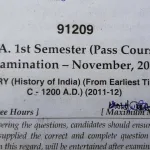Preparing for the B Ed 2nd semester exams requires understanding the questions asked in previous papers. This collection of questions and answers from 2016 helps students practice, analyze, and strengthen their preparation for all subjects, ensuring clarity and confidence in the examination process.
Educational Psychology
Question: What is the meaning of educational psychology?
Answer: Educational psychology is the study of how people learn, including teaching methods, instructional processes, and individual differences in learning.
Question: What is the importance of educational psychology in teaching?
Answer: Educational psychology helps teachers understand student behavior, learning needs, and teaching strategies for better outcomes.
Question: Define growth and development in psychology.
Answer: Growth refers to physical changes, while development includes overall changes in behavior, emotions, and skills over time.
Question: What are the stages of cognitive development according to Piaget?
Answer: Piaget’s stages are sensorimotor, preoperational, concrete operational, and formal operational.
Question: What is the role of motivation in learning?
Answer: Motivation encourages learners to engage in learning activities and achieve goals, enhancing performance and understanding.
Question: What are the different types of intelligence?
Answer: Types of intelligence include linguistic, logical-mathematical, spatial, musical, bodily-kinesthetic, interpersonal, intrapersonal, and naturalistic.
Question: What is classical conditioning?
Answer: Classical conditioning is a learning process where a neutral stimulus becomes associated with a meaningful stimulus to elicit a conditioned response.
Question: Define operant conditioning.
Answer: Operant conditioning is a learning process where behavior is influenced by reinforcement or punishment.
Question: What is the importance of reinforcement in learning?
Answer: Reinforcement strengthens desired behavior, making it more likely to occur in the future.
Question: What are the factors affecting learning?
Answer: Factors include motivation, interest, teaching methods, environment, and individual differences.
Question: What is the role of a teacher in educational psychology?
Answer: A teacher facilitates learning by understanding student needs, applying effective strategies, and fostering a positive environment.
Question: What is the meaning of personality development?
Answer: Personality development involves enhancing personal traits, behaviors, and attitudes to improve individuality and adaptability.
Question: What is the difference between intrinsic and extrinsic motivation?
Answer: Intrinsic motivation arises from internal desires, while extrinsic motivation is driven by external rewards or pressures.
Question: What is the significance of emotional intelligence?
Answer: Emotional intelligence helps individuals recognize, understand, and manage their emotions and relationships effectively.
Question: What is transfer of learning?
Answer: Transfer of learning occurs when knowledge or skills learned in one context are applied to another context.
Question: What are the characteristics of an effective teacher?
Answer: Characteristics include good communication, subject knowledge, empathy, adaptability, and the ability to inspire students.
Question: Define problem-solving in learning.
Answer: Problem-solving is the process of identifying solutions to complex or challenging situations.
Question: What is the role of creativity in education?
Answer: Creativity fosters innovation, critical thinking, and engagement in the learning process.
Question: What are the methods of educational research?
Answer: Methods include surveys, experiments, observations, case studies, and action research.
Philosophical Foundations of Education
Question: What is the meaning of philosophy in education?
Answer: Philosophy in education refers to the study of fundamental principles and practices guiding teaching and learning.
Question: What are the main branches of philosophy?
Answer: The main branches are metaphysics, epistemology, ethics, logic, and aesthetics.
Question: Define naturalism in education.
Answer: Naturalism emphasizes education according to natural principles, focusing on individual growth and development.
Question: What is the aim of pragmatism in education?
Answer: Pragmatism focuses on practical learning through experience and problem-solving.
Question: What is the concept of idealism in education?
Answer: Idealism emphasizes the development of the mind, values, and spiritual growth.
Question: Define realism in education.
Answer: Realism advocates for teaching based on the real world and objective knowledge.
Question: What is the importance of value education?
Answer: Value education teaches ethics, morals, and social responsibilities to create responsible citizens.
Question: What are the characteristics of a democratic education system?
Answer: Characteristics include participation, equality, freedom, and respect for individual rights.
Question: Define humanism in education.
Answer: Humanism focuses on individual dignity, potential, and the development of personal growth.
Question: What is the role of a teacher in a constructivist classroom?
Answer: A teacher facilitates learning by encouraging exploration, collaboration, and critical thinking.
Question: Define the concept of child-centered education.
Answer: Child-centered education prioritizes the needs, interests, and abilities of the child in the learning process.
Question: What is the difference between formal and informal education?
Answer: Formal education is structured and institution-based, while informal education occurs through daily experiences and interactions.
Question: What are the principles of inclusive education?
Answer: Principles include equal opportunities, diversity acceptance, and personalized learning for all students.
Question: What is the importance of discipline in education?
Answer: Discipline creates a conducive environment for learning and fosters responsibility, respect, and self-control.
Question: Define the concept of social justice in education.
Answer: Social justice ensures equal access to educational resources and opportunities for all individuals.
Question: What is the significance of ethics in teaching?
Answer: Ethics guide teachers in maintaining professionalism, fairness, and moral responsibility in their practice.
Question: What is the role of education in national development?
Answer: Education builds skilled individuals, promotes economic growth, and fosters social cohesion and innovation.
Question: What are the challenges in implementing educational reforms?
Answer: Challenges include resistance to change, lack of resources, and inadequate training for educators.
Question: What is the importance of lifelong learning?
Answer: Lifelong learning ensures continuous personal and professional growth, adapting to changing needs and environments.
Curriculum and Pedagogy
Question: What is the meaning of curriculum?
Answer: A curriculum is a structured set of learning objectives, materials, and activities designed for educational purposes.
Question: What are the types of curriculum?
Answer: Types include subject-centered, learner-centered, activity-based, and competency-based curriculums.
Question: Define pedagogy.
Answer: Pedagogy refers to the art and science of teaching, including methods and strategies for effective learning.
Question: What is the role of a teacher in curriculum development?
Answer: A teacher contributes by planning, implementing, and evaluating the curriculum to meet educational goals.
Question: What are the characteristics of a good curriculum?
Answer: Characteristics include clarity, relevance, flexibility, and alignment with educational objectives.
Question: What is the importance of co-curricular activities?
Answer: Co-curricular activities enhance student skills, teamwork, and holistic development beyond academics.
Question: Define differentiated instruction.
Answer: Differentiated instruction involves tailoring teaching methods to meet the diverse needs of students.
Question: What is the difference between formative and summative assessment?
Answer: Formative assessment monitors learning progress, while summative assessment evaluates overall achievement.
Question: What are the advantages of project-based learning?
Answer: Advantages include improved critical thinking, collaboration, and real-world problem-solving skills.
Question: What is the significance of feedback in teaching?
Answer: Feedback helps students understand their progress, identify areas for improvement, and stay motivated.
Question: Define the concept of peer learning.
Answer: Peer learning involves students collaborating to share knowledge and support each other’s learning.
Question: What are the challenges in implementing a learner-centered curriculum?
Answer: Challenges include resource constraints, teacher preparedness, and varying student needs.
Question: What is blended learning?
Answer: Blended learning combines traditional face-to-face teaching with online instructional methods.
Question: What is the importance of assessment in education?
Answer: Assessment measures learning outcomes, guides instruction, and ensures accountability in education.
Question: What are the elements of effective lesson planning?
Answer: Elements include clear objectives, engaging activities, resources, and evaluation strategies.
Question: Define inclusive pedagogy.
Answer: Inclusive pedagogy involves teaching practices that accommodate diverse learners, ensuring equal opportunities for success.
Question: What are the principles of experiential learning?
Answer: Principles include learning through experience, reflection, and applying knowledge to real-life situations.
Question: What is the role of technology in modern education?
Answer: Technology enhances learning by providing access to resources, interactive tools, and personalized instruction.
Question: What is the difference between teacher-centered and student-centered learning?
Answer: Teacher-centered focuses on instructor-led instruction, while student-centered emphasizes active learner participation.
questions from previous papers is a reliable way to gain confidence. This compilation of B Ed 2nd Sem 2016 questions and answers across subjects ensures clarity, thoroughness, and readiness for exams. Each subject is covered in depth with various types of questions, supporting a comprehensive understanding of key concepts and methods.
Related Posts:
Latest Posts
- Step-by-step guide to download and apply for jee mains admit card 202
- Comprehensive 2025 government holidays and recruitment details for job seekers
- JEE Mains Admit Card 2025: Your Step-by-Step Guide to Downloading the Hall Ticket
- Everything You Need to Know About 2025 Government Holidays Recruitment
- Comprehensive Guide to rrb d group recruitment 2025 – Eligibility, Vacancies, and Application
- Detailed guide to nps trust recruitment 2025 vacancies, eligibility and apply process
- Comprehensive guide to hpcl recruitment 2025 notification, vacancies, and application process
- ignou bed admission 2025 complete recruitment guide with eligibility and process
- Comprehensive Guide to Indian Army Agniveer Recruitment 2025 Notification and Jobs
- Everything You Must Know About CBSE Board Exams 2025 Changes & New Rules






